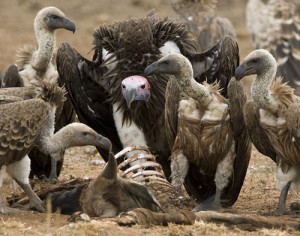Conservation Partnership – BirdLife International – has announced that vultures have rapidly become one of the most threatened families of birds on the planet. In a bid to stop this important family of birds slipping towards extinction in Europe and Africa, they have launched a global campaign asking for public support to Stop Vulture Poisoning Now.

Following recent catastrophic declines of vultures in Asia that left landscapes littered with carcasses, vultures in Europe and Africa may be set to follow unless we act now – warn conservationists from BirdLife International.
Vultures are important and essential for our health: “Vultures play a fundamental role that no other birds do: they clean our landscapes”, said Iván Ramírez, Head of Conservation for BirdLife International in Europe and Central Asia.
Yet they are facing new and massive threats across Europe and Africa.
A veterinary drug that is lethally toxic to vultures has been discovered to be commercially available in at least two European countries. Used to treat inflammation in livestock, this is the same drug (diclofenac) that has wiped out 99% of vultures in India, Pakistan and Nepal.
At the same time, vultures in Africa are facing increasing threats mainly due to poisoning (deliberate and accidental), persecution for body parts to be used in traditional medicine, habitat loss and collision with power-lines.
“Three of every four old-world vulture species are already globally threatened with extinction or Near Threatened according the IUCN Red List of Threatened Species”, said Kariuki Ndanganga, BirdLife Africa’s Species Programme Manager. “Unless threats are identified and tackled quickly and effectively, vultures in Africa and Europe could face extinction within our lifetime.”
The decline of vultures in Asia was shockingly fast – quicker than any other wild bird, including the Dodo. Within a decade – almost overnight in ecological timescales – species such as White-rumped Vulture fell by 99.9% as a result of diclofenac in India alone. “Where a thousand birds once flew, on average only a single bird survived the carnage,” added Ramírez.
Despite the tragic experience in Asia and the availability of safe and inexpensive drug alternatives, BirdLife has confirmed that, worryingly, veterinary diclofenac is now commercially available in Spain and Italy. Both these countries are strongholds for vultures in Europe.
As well as the impending threat of diclofenac, a multitude of other complex threats need to be unravelled further in Africa, and investment needed to tackle them.
As a result, BirdLife International – the world’s largest Partnership of conservation organisations – is calling for support towards a ‘Stop Vulture Poisoning Now’ conservation campaign.
BirdLife International knows what needs to happen, and with your support we can fight to save the lives of millions of vultures across Europe and Africa. With a Partnership of over 100 independent organisations worldwide, BirdLife has the power and the ability to save vultures.
“We know what we need to do in Europe – ban veterinary diclofenac”, said Jim Lawrence, BirdLife’s Preventing Extinctions Programme Manager. “We also know what we need to do for Africa – urgently understand fully the threats and extinction risk so we can act quickly, with priority”.
“However you see them, please support the urgent work needed to save Africa and Europe’s threatened vultures by generously supporting our appeal”, concluded Lawrence. “Your support is vital to this work and will make a real difference to its success. So please, dig deep, donate generously now and help us keep vultures flying as high as they should be”.
BirdLife International is believed to be the world’s largest nature conservation Partnership. Together they have 120 BirdLife Partners worldwide – one per country or territory – and growing with 13 million members and supporters.
BirdLife International and the Vulture Conservation Foundation are advocating for a complete ban on the use of veterinary diclofenac in the EU. In parallel, BirdLife Partners are working nationally to inform local authorities and diclofenac distributors of the risk linked to the veterinary use of this dangerous drug.
Diclofenac is a non-steroid anti-inflammatory drug (NSAID) present in many commonly used drugs that are used for treating moderate pain. It is extremely toxic to vultures in small doses. Its use on cattle wiped out 99% of the vulture population in South Asia in the 90’s. Vultures eating cattle treated with a veterinary dose of diclofenac will die in less than two days.
There are 21 species of vultures in the world, five of which can be found in the American continent. The other 16 are distributed across Africa, Europe and Asia. Of these so-called Old World vultures, 75% are globally threatened or near-threatened, with the number of threatened species expected to rise in the next conservation status assessment.
Four vulture species breed in Europe: the Endangered Egyptian Vulture, the Near Threatened Cinereous Vulture, and important populations of Griffon Vulture and Bearded Vulture. Three of the four vulture populations have been increasing steadily (except the Egyptian Vulture), partly due to the intensive conservation efforts funded by European Union budget lines. Since 1996, the EU and national governments have invested significant financial resources on the conservation of vultures, and there have been at least 67 LIFE projects related to these species – between 2008 and 2012, nine vulture conservation projects alone received 10.7 million Euros.
Of 11 vulture species found in Africa, seven (including five of the six species endemic to Africa) are listed as globally threatened. Five of these species joined the Red List of threatened species only in the last seven years. For instance, Hooded Vulture – a species that has historically been widespread in Africa – was listed as Endangered in 2011
